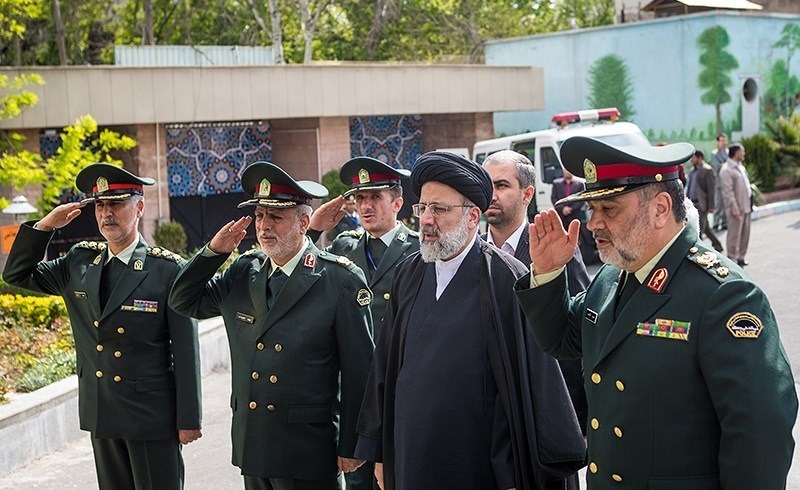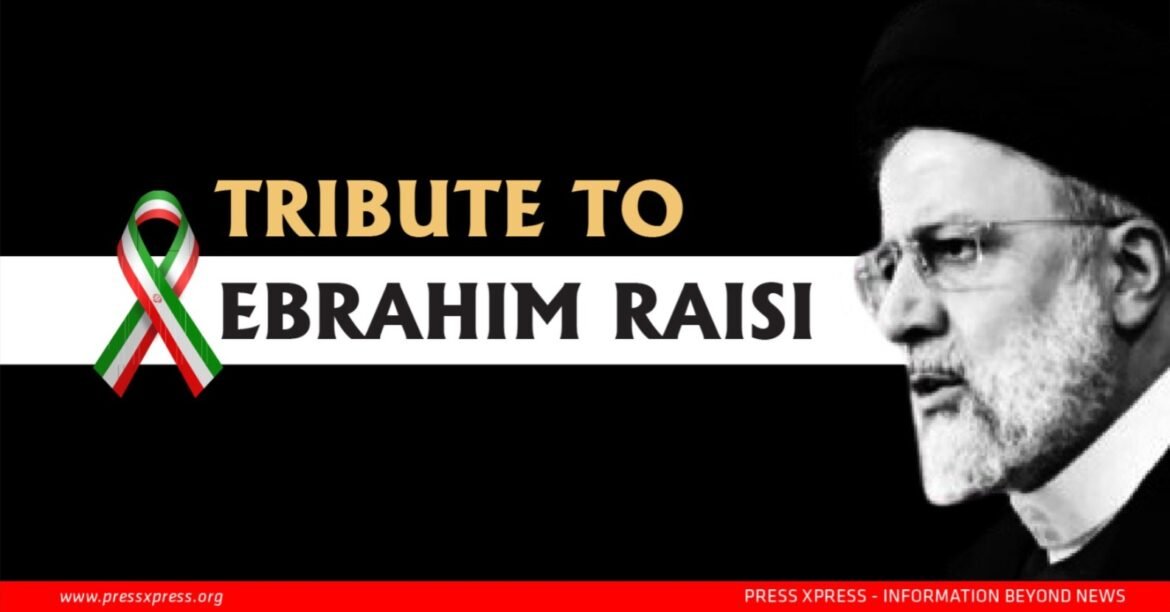Iranian President Ebrahim Raisi’s tragic death has generated dozens of questions, whether it was an accident or sabotage?
Indeed, very prominently he was a global figure with an image of an influential Iranian cleric and prudent politician who served as the president of Iran from 2021 until his tragic passing in a helicopter crash on May 19, 2024, and the tragedy ended up the lives of nine high officials, including President Ebrahim Raisi.
The Iranian president was en route to the Khodaafarin Dam in East Azerbaijan, where he along with President of Azerbaijan Ilham Aliyev inaugurated it. The cursed helicopter carrying Raisi, Iran’s Foreign Minister Hossein Amirabdollahian, and several other top officials collapsed in a remote and mountainous region in the Arasbaran Forest, near the border with Azerbaijan in the Varzeqan region. The disaster occurred in deep fog, and the cause is yet unknown as the Iranian authority crossed-lip. However, experts assume that the tragedy was caused either by the pilot’s mistake, mechanical failure, or bad weather. Military drones and around 40 rescue teams searched for almost 12 hours before finding the wreckage with the help of Turkey’s drone.
You can also read: Mystery Lingers Over Iran President’s Death
Raisi has been essential to Iran for decades and was a frontrunner to succeed Ayatollah Ali Khamenei as supreme leader. This tragic event took place at a highly tumultuous time for Iran, amidst ongoing tensions in the Middle East.

EARLY LIFE
Raisi was born in 1960 in a cleric family in Mashhad, Iran’s holiest city. Since Raisi’s birth, land reform (1960– 1963) and the White Revolution development program (1963–1979) had transformed Iran’s power and income distribution. His clergyman father died when he was five. Following his father’s footsteps, Raisi studied Islamic law and jurisprudence at Qom Seminary in 1975, placing him at Shia Islam’s intellectual center. In Qom, Raisi was influenced by Ruhollah Khomeini’s revolutionary beliefs and exposure to revolutionary thinking likely affected his political career. Raisi was reportedly involved in the 1978–1979 events that exiled Mohammad Reza Shah Pahlavi and founded Khomeini’s administration.
RISING THROUGH RANKS
Raisi quickly advanced in Iran’s judicial system after the revolution, training under Ayatollah Khamenei, who became president in 1981. Raisi was the first prosecutor general of Karaj, a Tehran suburb. At 25, he became Tehran’s deputy prosecutor in 1985. During the Iran-Iraq War in 1988, Ayatollah Khomeini executed 5000 political prisoners accused of Iraq collaboration. A judge on the “Death Committee” tribunal, Ebrahim Raisi was known as the “Butcher of Tehran.” It also led to US sanctions against the future president. But, Raisi was designated curator of Mashhad’s affluent Astan Quds Razavi religious foundation by Khamenei in 2016. He regulated massive financial resources and religious and political authority in Iran. His tenure included expanding the foundation’s economic and social projects.
RISE TO PRESIDENCY
Raisi ran for president in 2017 against moderate Hassan Rouhani, who advocated economic reforms and foreign engagement. Rouhani won 57% of the vote despite Raisi’s conservative credentials and uncompromising support. Rouhani won due to his moderate stance and appealing economic ideas to a large segment of the population. Raisi remained in politics after his 2017 defeat. He maintained his political profile by using his positions in Iran’s court system and clerical ties. This period helped Raisi strengthen his support and prepare for another presidential candidacy. Ayatollah Khamenei appointed him judiciary chief in 2019.
CONQUERING PRESIDENCY

Raisi campaigned again in 2021, capitalizing on the changing political atmosphere and conservative displeasure with Rouhani’s policies. He said he had “come as an independent to the stage to make changes in the executive management of the country and to fight poverty, corruption, humiliation and discrimination”. His campaign emphasized social conservatism, economic self-reliance, and a harder posture against the West, appealing to those who felt Rouhani had not adequately addressed Iran’s economic and geopolitical issues.
He defeated his opponent with 62% of the vote in the first round. Raisi pledged to “improve the economy to resolve the nation’s problems” and “support any diplomatic plan” to eliminate sanctions when he began his four-year tenure in August. The long-stalled discussions to revive a 2015 deal limiting Iran’s nuclear program have been close to collapse since the Trump administration abandoned it and imposed severe US economic penalties in 2018. Raisi also promised to restore relations with Iran’s neighbors while justifying its regional actions as a “stabilizing force”.
GLOBAL GEOPOLITICS DURING RAISI’S TERM
Ebrahim Raisi took office in August 2021 during public outrage over international sanctions and the COVID-19 pandemic lowering living standards. He also wanted to shift Iran’s foreign policy toward Asia, particularly China. Under him, Iran made numerous strategic advances, particularly with its “Look East” initiative. Raisi had expressed the strengthening of commercial and trade links with Bangladesh and his administration’s commitment to other Muslim nations, along with China and other Asian countries. Raisi’s government has expressed a sincere commitment to enhancing its partnership with the Eurasian Economic Union (EAEU). The EAEU includes Armenia, Belarus, Kazakhstan, Kyrgyzstan, Russia, and Tajikistan. He focused on improving Iran’s relations with regional neighbors and global powers like China and Russia. In 2023, his administration reestablished diplomatic relations with Saudi Arabia, a major
diplomatic victory given their longstanding disagreements. This measure was intended to strengthen regional stability and economic cooperation. Iranian backing for regional allies, particularly Yemen and Palestine, increased under Raisi. Raisi wanted to invest more in the Houthi movement in Yemen and support the Palestinian cause. Raisi’s administration supported the Palestinian cause, which Muslim nations wholeheartedly appreciated. On April 15, 2024, Iran launched its first frontal attack on Israel with 120 ballistic missiles, 170 drones, and 30 cruise missiles under his leadership. This position solidified Iran’s leadership on Palestinian rights and garnered regional backing.

CONTROVERSIES
Ebrahim Raisi’s presidency was defined by domestic and international issues and successes. During his administration, surveillance and censorship increased, targeting opposition and state-sanctioned attire. In late 2022, public fury erupted over Iran’s morality police’s killing of 22-year-old Mahsa Amini during her detention as she left a Tehran metro station with her family for alleged hijab violations. Iranian women protested for months, removing or burning their hijabs and cutting their hair. Foreign human rights organizations reported 500 deaths when security forces broke up the gatherings in mid-2023. Seven unrest culprits were executed. Raisi was slammed for his economic management.
Despite improvements like eliminating the subsidized currency rate and instituting an electronic coupon plan to manage prices, Iran’s economy remained poor. Inflation rose, unemployment rose, and many Iranians battled with high living costs. Public unrest and riots followed the abrupt termination of food subsidies in May 2022, which raised food prices. Ebrahim Raisi’s presidency was defined by a combination of domestic prudence and repression, international confrontations, and economic struggles. His legacy is multifaceted; supporters regard him as a defender of the Islamic Republic’s principles, while critics regard him as a symbol of the regime’s oppressive tactics and governance failures.

PERSONAL LIFE
Raisi’s private life was largely unknown, with the exception of the fact that his wife, Jamileh, was a professor at Shahid Beheshti University in Tehran, and that they had two adult daughters.


